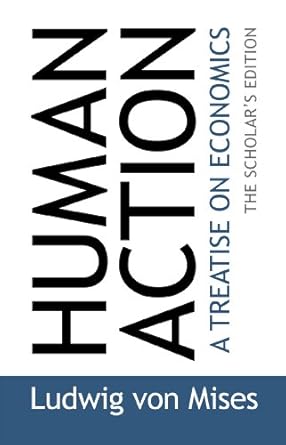A Synthesis of Ludwig von Mises's Human Action: Economics Treatise
Category: ludwig von mises

The most authoritative, yet overly lengthy, treatise on Austrian Economics has been condensed into a digestible summary. There is no crafty Keynesianism or academic obfuscation present, but rather a succinct series of building blocks based on actual human behavior, leading to rational truths at the societal level. This synthesis can be used as a sort of Cliff's Notes to a timeless classic.
The original text has been condensed to one-sixteenth its length and organized into the three states of relative market freedom: free, mixed (government interventions), and un-free (socialism). This structure provides a clear and concise framework for understanding the core principles of Austrian Economics.
In the free market state, the focus is on the actions and choices of individual actors, unhindered by government intervention. The core tenet is that the free market, driven by the subjective valuations and voluntary exchanges of individuals, is the most efficient and just method of resource allocation. This naturally leads to the recognition of private property rights and the rejection of coercion as a means of social organization.
The mixed market state introduces government interventions, such as regulations, subsidies, and price controls, which distort the natural workings of the free market. These interventions, driven by political agendas rather than the subjective preferences of individuals, create inefficiencies, inequities, and unintended consequences. The Austrian perspective emphasizes the importance of understanding the dynamic and interconnected nature of economic systems, where seemingly well-intentioned interventions can have far-reaching and detrimental effects.
In the un-free, or socialist, state, the means of production are owned and controlled by the state, rather than by private individuals. This centralized planning and decision-making process inevitably leads to a misallocation of resources, as the subjective knowledge and preferences of millions of individuals cannot be effectively captured by a small group of planners. The result is shortages, surpluses, and a general decline in societal well-being.
Throughout this concise yet comprehensive summary, the core principles of Austrian Economics are presented in a clear and accessible manner. The focus on human action, the rejection of mathematical models as a means of understanding complex social phenomena, and the emphasis on the importance of individual liberty and private property rights are all key tenets that are effectively conveyed.
This distillation of the most authoritative treatise on Austrian Economics provides a valuable resource for those seeking a deeper understanding of this influential economic school of thought, without the burden of wading through the original, lengthy work. It serves as a succinct and engaging introduction to the timeless insights of Austrian Economics.
product information:
| Attribute | Value | ||||
|---|---|---|---|---|---|
| publisher | Seekers Press (February 11, 2024) | ||||
| language | English | ||||
| paperback | 58 pages | ||||
| isbn_10 | 0966933761 | ||||
| isbn_13 | 978-0966933765 | ||||
| item_weight | 5 ounces | ||||
| dimensions | 6 x 0.14 x 9 inches | ||||
| best_sellers_rank | #543,757 in Books (See Top 100 in Books) #345 in Economic Policy #458 in Economic Policy & Development (Books) #1,146 in Economic History (Books) | ||||
| customer_reviews |
|






![Socialism: An Economic and Sociological Analysis [New Edition, Enlarged with an Epilogue]](https://m.media-amazon.com/images/I/41P7SyGw7IL._SY445_SX342_.jpg)












